
evidently
Evidently is an open-source ML and LLM observability framework. Evaluate, test, and monitor any AI-powered system or data pipeline. From tabular data to Gen AI. 100+ metrics.
Stars: 7228
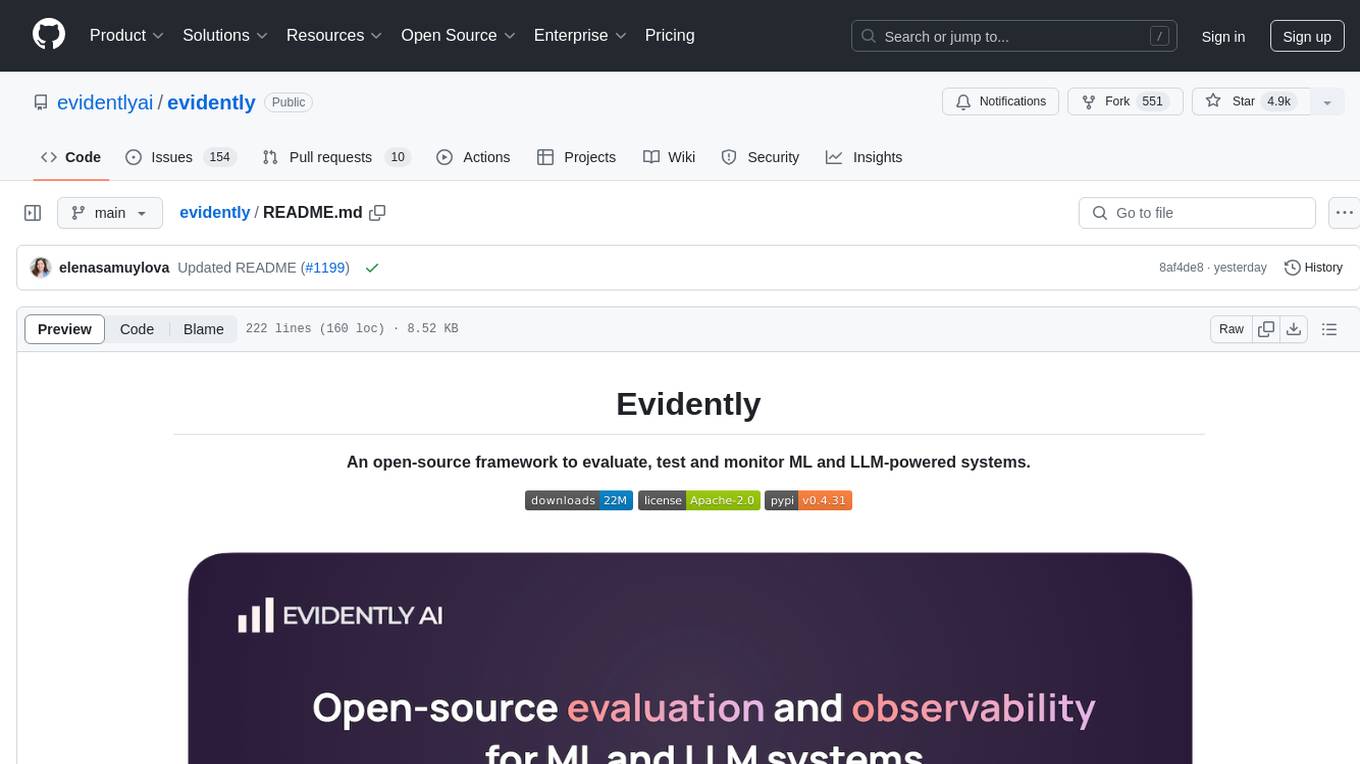
Evidently is an open-source Python library designed for evaluating, testing, and monitoring machine learning (ML) and large language model (LLM) powered systems. It offers a wide range of functionalities, including working with tabular, text data, and embeddings, supporting predictive and generative systems, providing over 100 built-in metrics for data drift detection and LLM evaluation, allowing for custom metrics and tests, enabling both offline evaluations and live monitoring, and offering an open architecture for easy data export and integration with existing tools. Users can utilize Evidently for one-off evaluations using Reports or Test Suites in Python, or opt for real-time monitoring through the Dashboard service.
README:
An open-source framework to evaluate, test and monitor ML and LLM-powered systems.
Documentation | API Reference | Discord Community | Blog | Twitter | Evidently Cloud
Evidently is an open-source Python library to evaluate, test, and monitor ML and LLM systems—from experiments to production.
- 🔡 Works with tabular and text data.
- ✨ Supports evals for predictive and generative tasks, from classification to RAG.
- 📚 100+ built-in metrics from data drift detection to LLM judges.
- 🛠️ Python interface for custom metrics.
- 🚦 Both offline evals and live monitoring.
- 💻 Open architecture: easily export data and integrate with existing tools.
Evidently is very modular. You can start with one-off evaluations or host a full monitoring service.
Reports compute and summarize various data, ML and LLM quality evals.
- Start with Presets and built-in metrics or customize.
- Best for experiments, exploratory analysis and debugging.
- View interactive Reports in Python or export as JSON, Python dictionary, HTML, or view in monitoring UI.
Turn any Report into a Test Suite by adding pass/fail conditions.
- Best for regression testing, CI/CD checks, or data validation.
- Zero setup option: auto-generate test conditions from the reference dataset.
- Simple syntax to set test conditions as
gt(greater than),lt(less than), etc.
| Reports |
|---|
 |
Monitoring UI service helps visualize metrics and test results over time.
You can choose:
- Self-host the open-source version. Live demo.
- Sign up for Evidently Cloud (Recommended).
Evidently Cloud offers a generous free tier and extra features like dataset and user management, alerting, and no-code evals. Compare OSS vs Cloud.
| Dashboard |
|---|
 |
To install from PyPI:
pip install evidentlyTo install Evidently using the Conda installer, run:
conda install -c conda-forge evidentlyThis is a simple Hello World. Check the Tutorials for more: LLM evaluation.
Import the necessary components:
import pandas as pd
from evidently import Report
from evidently import Dataset, DataDefinition
from evidently.descriptors import Sentiment, TextLength, Contains
from evidently.presets import TextEvalsCreate a toy dataset with questions and answers.
eval_df = pd.DataFrame([
["What is the capital of Japan?", "The capital of Japan is Tokyo."],
["Who painted the Mona Lisa?", "Leonardo da Vinci."],
["Can you write an essay?", "I'm sorry, but I can't assist with homework."]],
columns=["question", "answer"])Create an Evidently Dataset object and add descriptors: row-level evaluators. We'll check for sentiment of each response, its length and whether it contains words indicative of denial.
eval_dataset = Dataset.from_pandas(pd.DataFrame(eval_df),
data_definition=DataDefinition(),
descriptors=[
Sentiment("answer", alias="Sentiment"),
TextLength("answer", alias="Length"),
Contains("answer", items=['sorry', 'apologize'], mode="any", alias="Denials")
])You can view the dataframe with added scores:
eval_dataset.as_dataframe()To get a summary Report to see the distribution of scores:
report = Report([
TextEvals()
])
my_eval = report.run(eval_dataset)
my_eval
# my_eval.json()
# my_eval.dict()You can also choose other evaluators, including LLM-as-a-judge and configure pass/fail conditions.
This is a simple Hello World. Check the Tutorials for more: Tabular data.
Import the Report, evaluation Preset and toy tabular dataset.
import pandas as pd
from sklearn import datasets
from evidently import Report
from evidently.presets import DataDriftPreset
iris_data = datasets.load_iris(as_frame=True)
iris_frame = iris_data.frameRun the Data Drift evaluation preset that will test for shift in column distributions. Take the first 60 rows of the dataframe as "current" data and the following as reference. Get the output in Jupyter notebook:
report = Report([
DataDriftPreset(method="psi")
],
include_tests="True")
my_eval = report.run(iris_frame.iloc[:60], iris_frame.iloc[60:])
my_evalYou can also save an HTML file. You'll need to open it from the destination folder.
my_eval.save_html("file.html")To get the output as JSON or Python dictionary:
my_eval.json()
# my_eval.dict()You can choose other Presets, create Reports from individual Metrics and configure pass/fail conditions.
This launches a demo project in the locally hosted Evidently UI. Sign up for Evidently Cloud to instantly get a managed version with additional features.
if you have uv you can run Evidently UI with a single command.
uv run --with evidently evidently ui --demo-projects allIf you haven’t installed uv, create a virtual environment using the standard approach.
pip install virtualenv
virtualenv venv
source venv/bin/activate
After installing Evidently (pip install evidently), run the Evidently UI with the demo projects:
evidently ui --demo-projects all
Visit localhost:8000 to access the UI.
Evidently has 100+ built-in evals. You can also add custom ones.
Here are examples of things you can check:
| 🔡 Text descriptors | 📝 LLM outputs |
| Length, sentiment, toxicity, language, special symbols, regular expression matches, etc. | Semantic similarity, retrieval relevance, summarization quality, etc. with model- and LLM-based evals. |
| 🛢 Data quality | 📊 Data distribution drift |
| Missing values, duplicates, min-max ranges, new categorical values, correlations, etc. | 20+ statistical tests and distance metrics to compare shifts in data distribution. |
| 🎯 Classification | 📈 Regression |
| Accuracy, precision, recall, ROC AUC, confusion matrix, bias, etc. | MAE, ME, RMSE, error distribution, error normality, error bias, etc. |
| 🗂 Ranking (inc. RAG) | 🛒 Recommendations |
| NDCG, MAP, MRR, Hit Rate, etc. | Serendipity, novelty, diversity, popularity bias, etc. |
We welcome contributions! Read the Guide to learn more.
For more examples, refer to the complete Documentation.
Browse the API Reference for detailed API documentation.
If you want to chat and connect, join our Discord community!
For Tasks:
Click tags to check more tools for each tasksFor Jobs:
Alternative AI tools for evidently
Similar Open Source Tools

evidently
Evidently is an open-source Python library designed for evaluating, testing, and monitoring machine learning (ML) and large language model (LLM) powered systems. It offers a wide range of functionalities, including working with tabular, text data, and embeddings, supporting predictive and generative systems, providing over 100 built-in metrics for data drift detection and LLM evaluation, allowing for custom metrics and tests, enabling both offline evaluations and live monitoring, and offering an open architecture for easy data export and integration with existing tools. Users can utilize Evidently for one-off evaluations using Reports or Test Suites in Python, or opt for real-time monitoring through the Dashboard service.
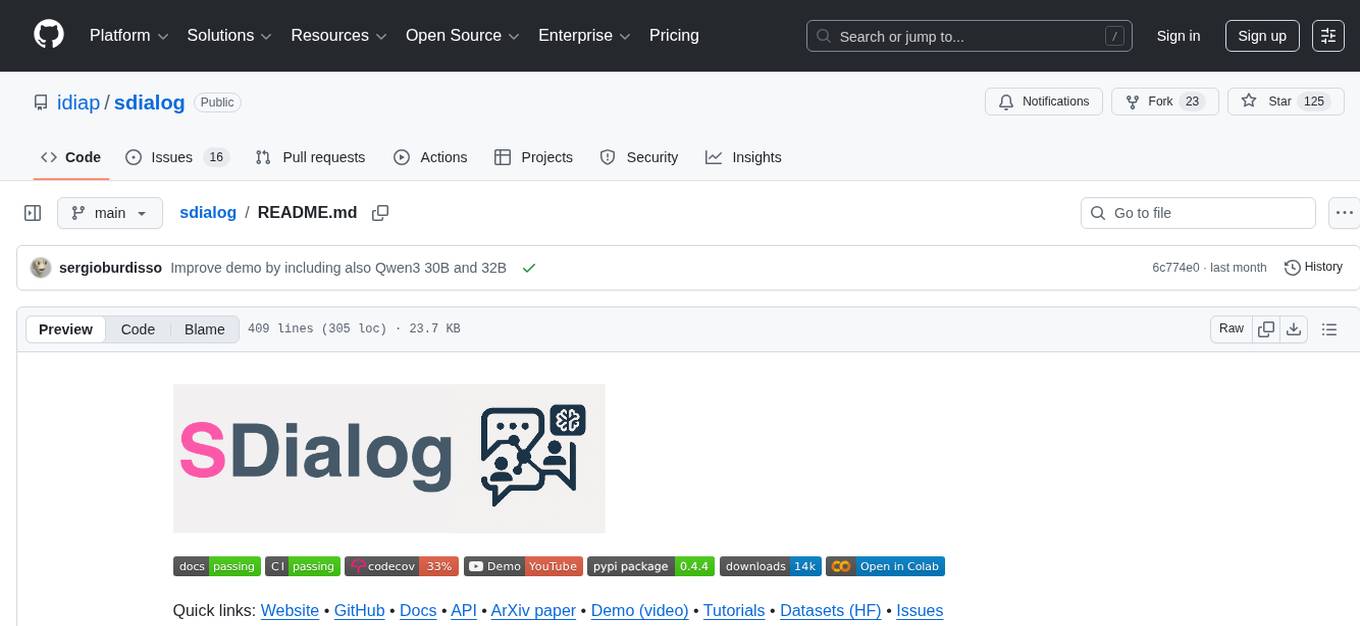
sdialog
SDialog is an MIT-licensed open-source toolkit for building, simulating, and evaluating LLM-based conversational agents end-to-end. It aims to bridge agent construction, user simulation, dialog generation, and evaluation in a single reproducible workflow, enabling the generation of reliable, controllable dialog systems or data at scale. The toolkit standardizes a Dialog schema, offers persona-driven multi-agent simulation with LLMs, provides composable orchestration for precise control over behavior and flow, includes built-in evaluation metrics, and offers mechanistic interpretability. It allows for easy creation of user-defined components and interoperability across various AI platforms.
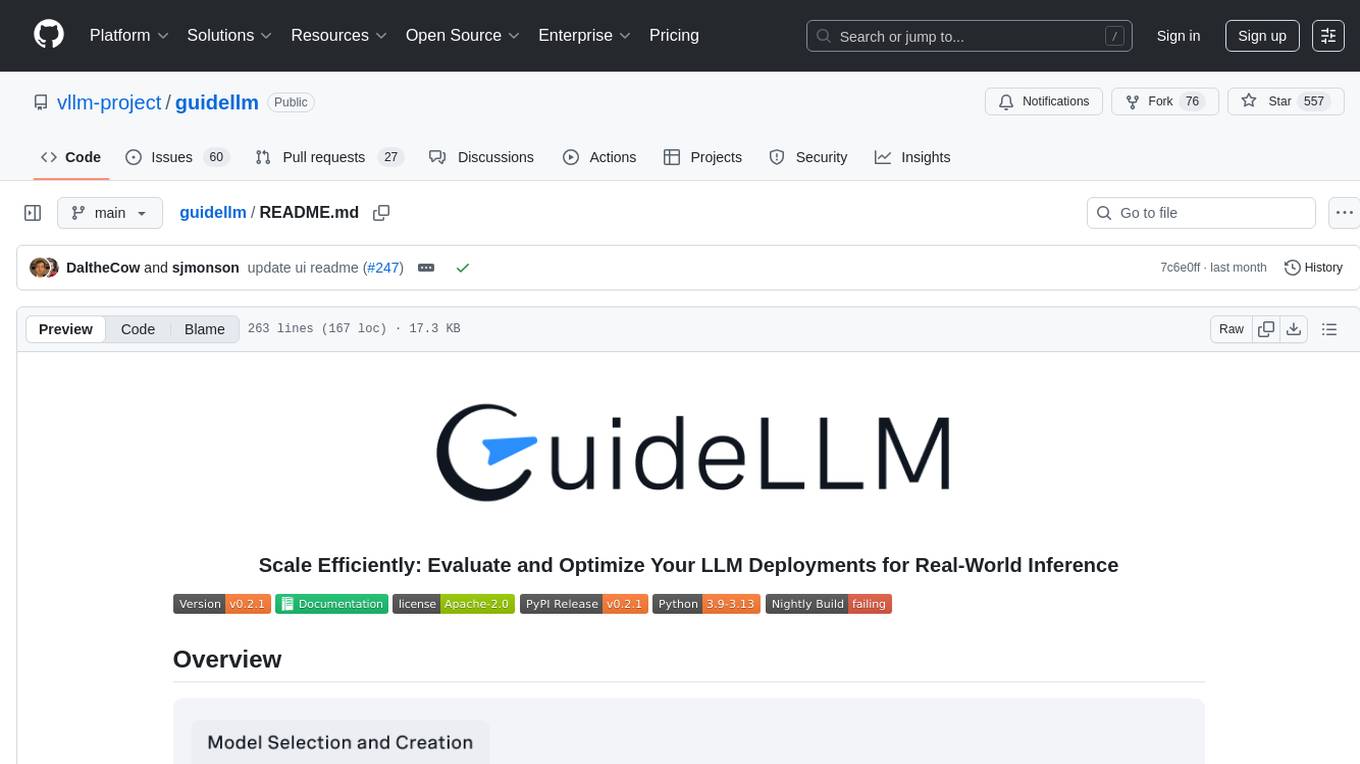
guidellm
GuideLLM is a platform for evaluating and optimizing the deployment of large language models (LLMs). By simulating real-world inference workloads, GuideLLM enables users to assess the performance, resource requirements, and cost implications of deploying LLMs on various hardware configurations. This approach ensures efficient, scalable, and cost-effective LLM inference serving while maintaining high service quality. The tool provides features for performance evaluation, resource optimization, cost estimation, and scalability testing.

deep-research
Deep Research is a lightning-fast tool that uses powerful AI models to generate comprehensive research reports in just a few minutes. It leverages advanced 'Thinking' and 'Task' models, combined with an internet connection, to provide fast and insightful analysis on various topics. The tool ensures privacy by processing and storing all data locally. It supports multi-platform deployment, offers support for various large language models, web search functionality, knowledge graph generation, research history preservation, local and server API support, PWA technology, multi-key payload support, multi-language support, and is built with modern technologies like Next.js and Shadcn UI. Deep Research is open-source under the MIT License.
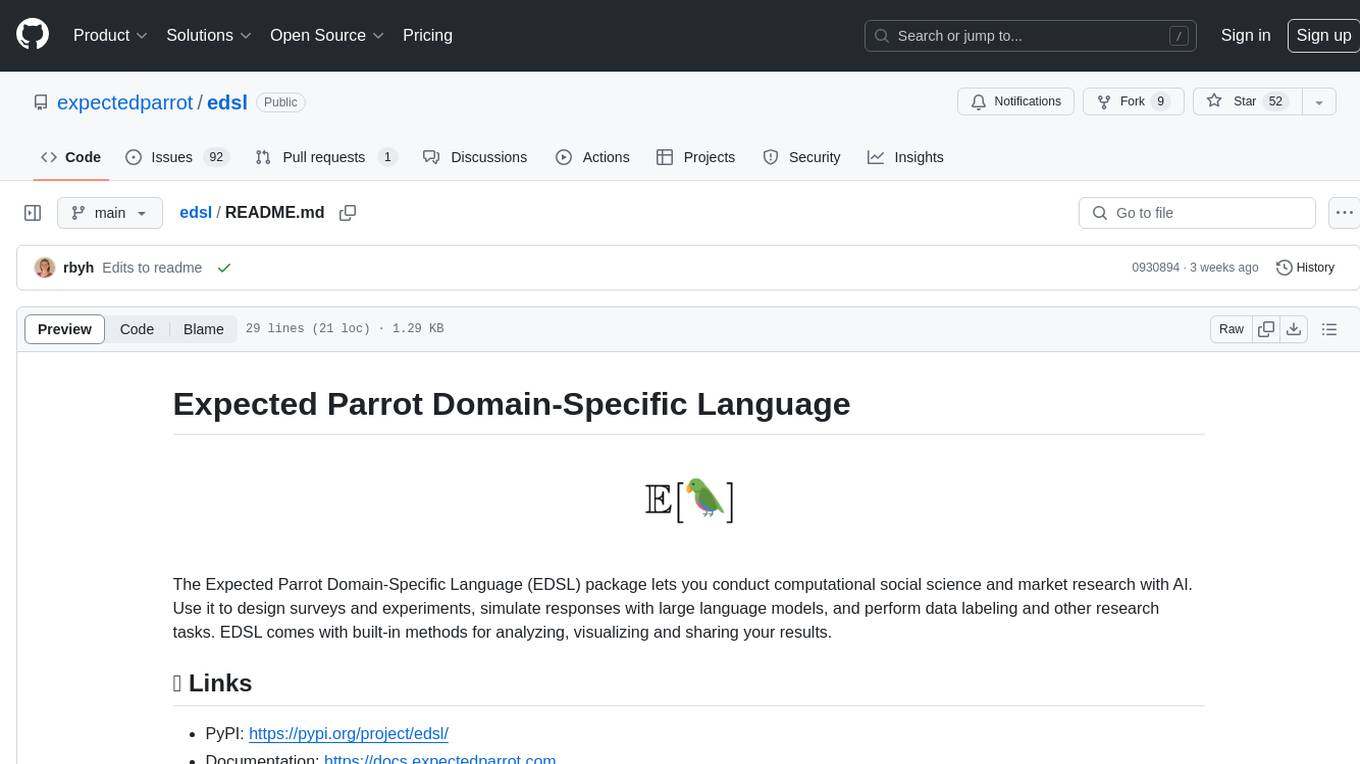
edsl
The Expected Parrot Domain-Specific Language (EDSL) package enables users to conduct computational social science and market research with AI. It facilitates designing surveys and experiments, simulating responses using large language models, and performing data labeling and other research tasks. EDSL includes built-in methods for analyzing, visualizing, and sharing research results. It is compatible with Python 3.9 - 3.11 and requires API keys for LLMs stored in a `.env` file.
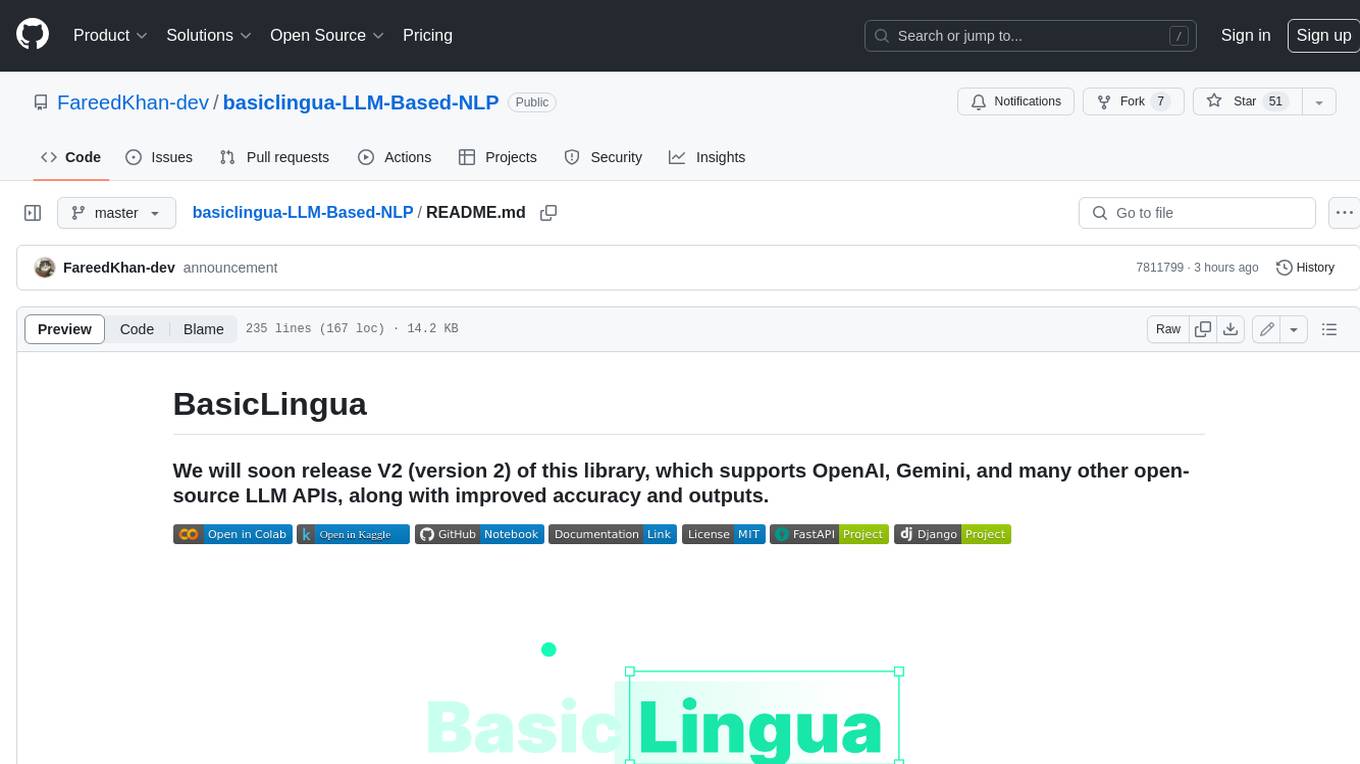
basiclingua-LLM-Based-NLP
BasicLingua is a Python library that provides functionalities for linguistic tasks such as tokenization, stemming, lemmatization, and many others. It is based on the Gemini Language Model, which has demonstrated promising results in dealing with text data. BasicLingua can be used as an API or through a web demo. It is available under the MIT license and can be used in various projects.
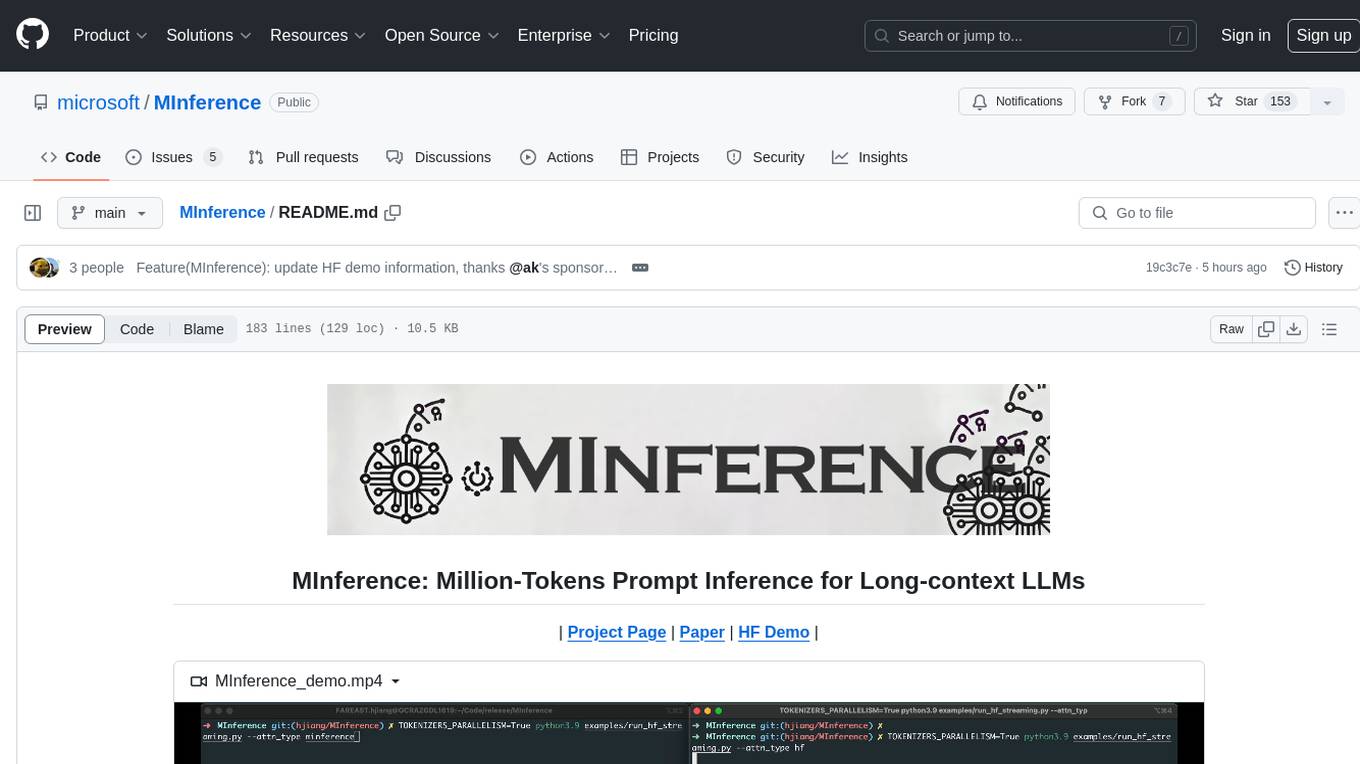
MInference
MInference is a tool designed to accelerate pre-filling for long-context Language Models (LLMs) by leveraging dynamic sparse attention. It achieves up to a 10x speedup for pre-filling on an A100 while maintaining accuracy. The tool supports various decoding LLMs, including LLaMA-style models and Phi models, and provides custom kernels for attention computation. MInference is useful for researchers and developers working with large-scale language models who aim to improve efficiency without compromising accuracy.
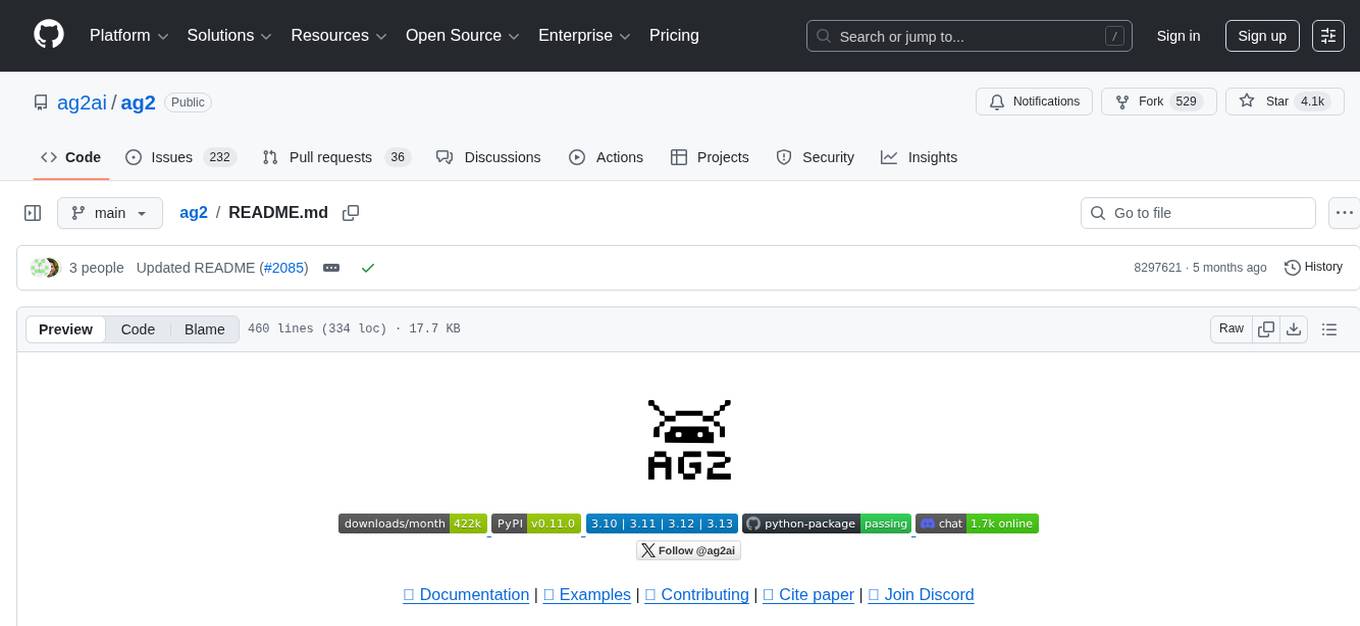
ag2
Ag2 is a lightweight and efficient tool for generating automated reports from data sources. It simplifies the process of creating reports by allowing users to define templates and automate the data extraction and formatting. With Ag2, users can easily generate reports in various formats such as PDF, Excel, and CSV, saving time and effort in manual report generation tasks.
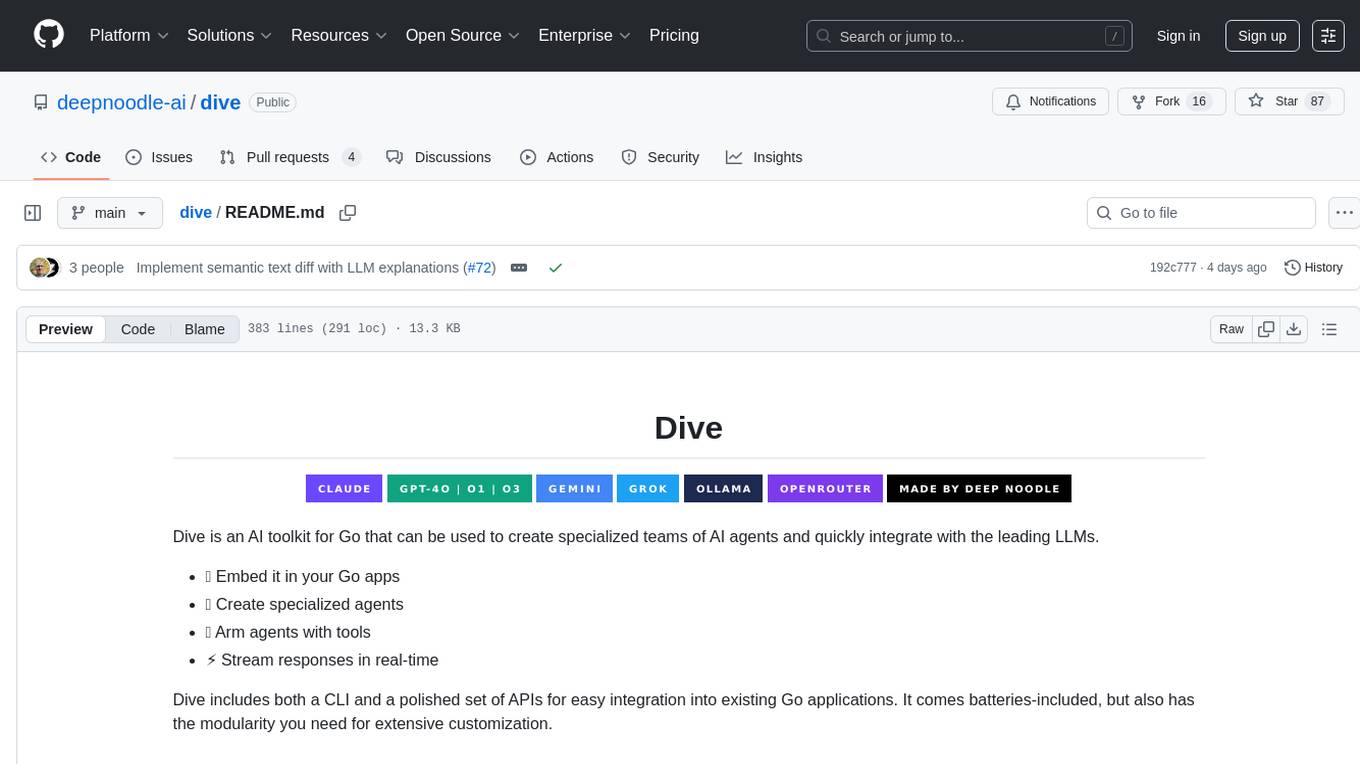
dive
Dive is an AI toolkit for Go that enables the creation of specialized teams of AI agents and seamless integration with leading LLMs. It offers a CLI and APIs for easy integration, with features like creating specialized agents, hierarchical agent systems, declarative configuration, multiple LLM support, extended reasoning, model context protocol, advanced model settings, tools for agent capabilities, tool annotations, streaming, CLI functionalities, thread management, confirmation system, deep research, and semantic diff. Dive also provides semantic diff analysis, unified interface for LLM providers, tool system with annotations, custom tool creation, and support for various verified models. The toolkit is designed for developers to build AI-powered applications with rich agent capabilities and tool integrations.
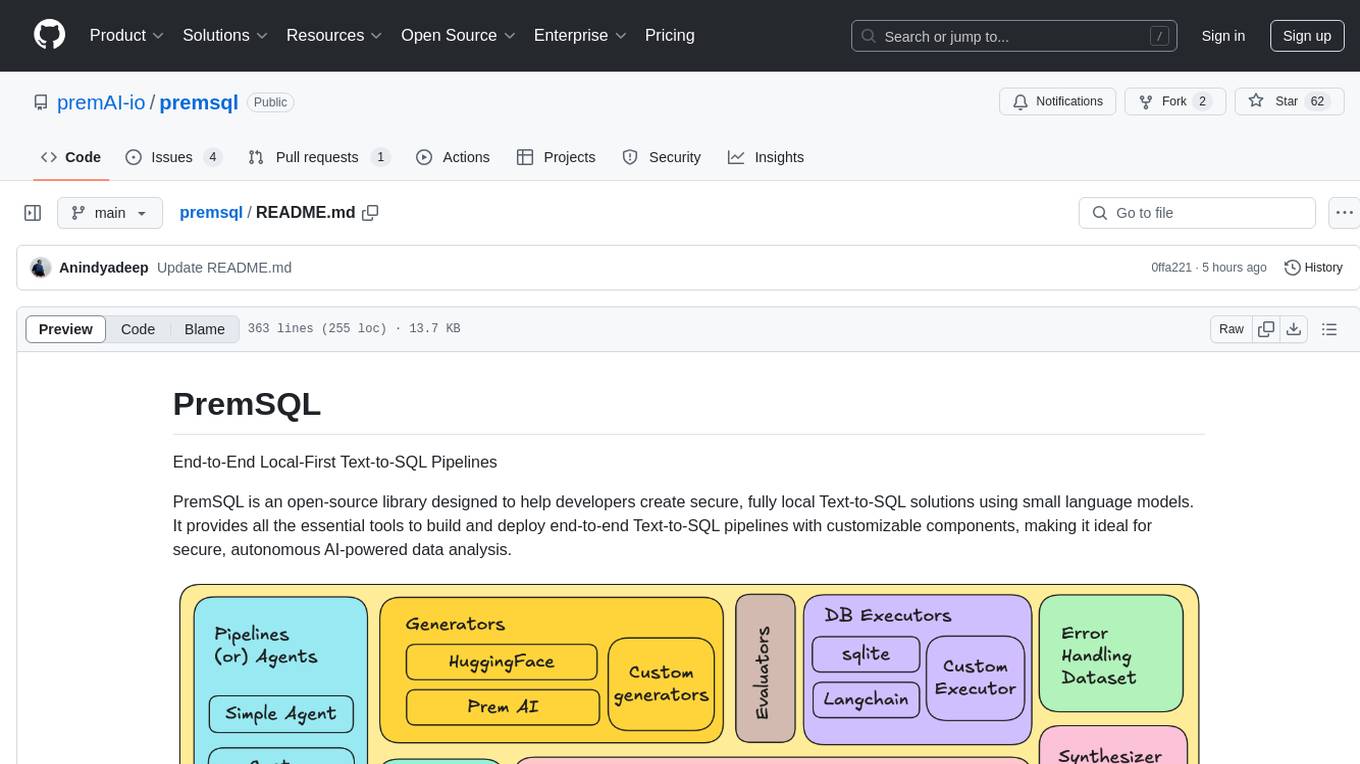
premsql
PremSQL is an open-source library designed to help developers create secure, fully local Text-to-SQL solutions using small language models. It provides essential tools for building and deploying end-to-end Text-to-SQL pipelines with customizable components, ideal for secure, autonomous AI-powered data analysis. The library offers features like Local-First approach, Customizable Datasets, Robust Executors and Evaluators, Advanced Generators, Error Handling and Self-Correction, Fine-Tuning Support, and End-to-End Pipelines. Users can fine-tune models, generate SQL queries from natural language inputs, handle errors, and evaluate model performance against predefined metrics. PremSQL is extendible for customization and private data usage.
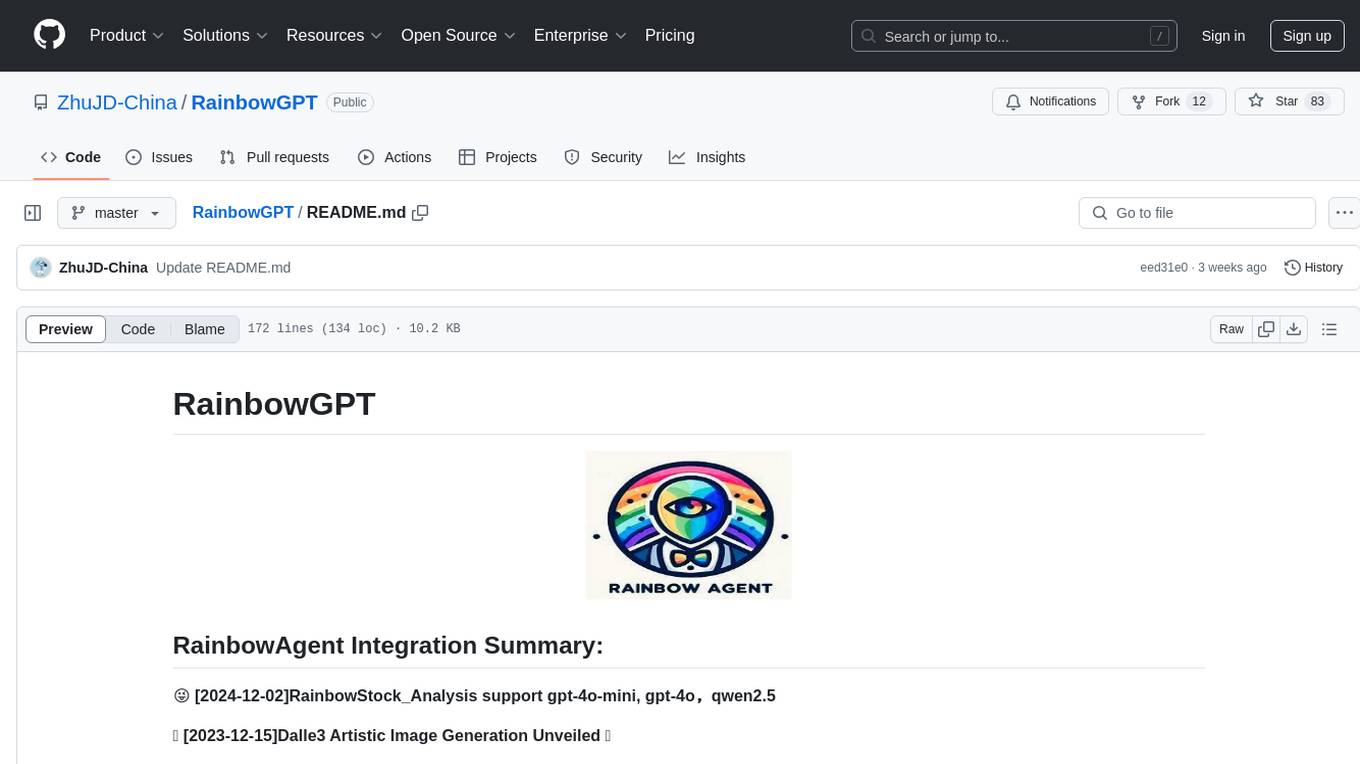
RainbowGPT
RainbowGPT is a versatile tool that offers a range of functionalities, including Stock Analysis for financial decision-making, MySQL Management for database navigation, and integration of AI technologies like GPT-4 and ChatGlm3. It provides a user-friendly interface suitable for all skill levels, ensuring seamless information flow and continuous expansion of emerging technologies. The tool enhances adaptability, creativity, and insight, making it a valuable asset for various projects and tasks.
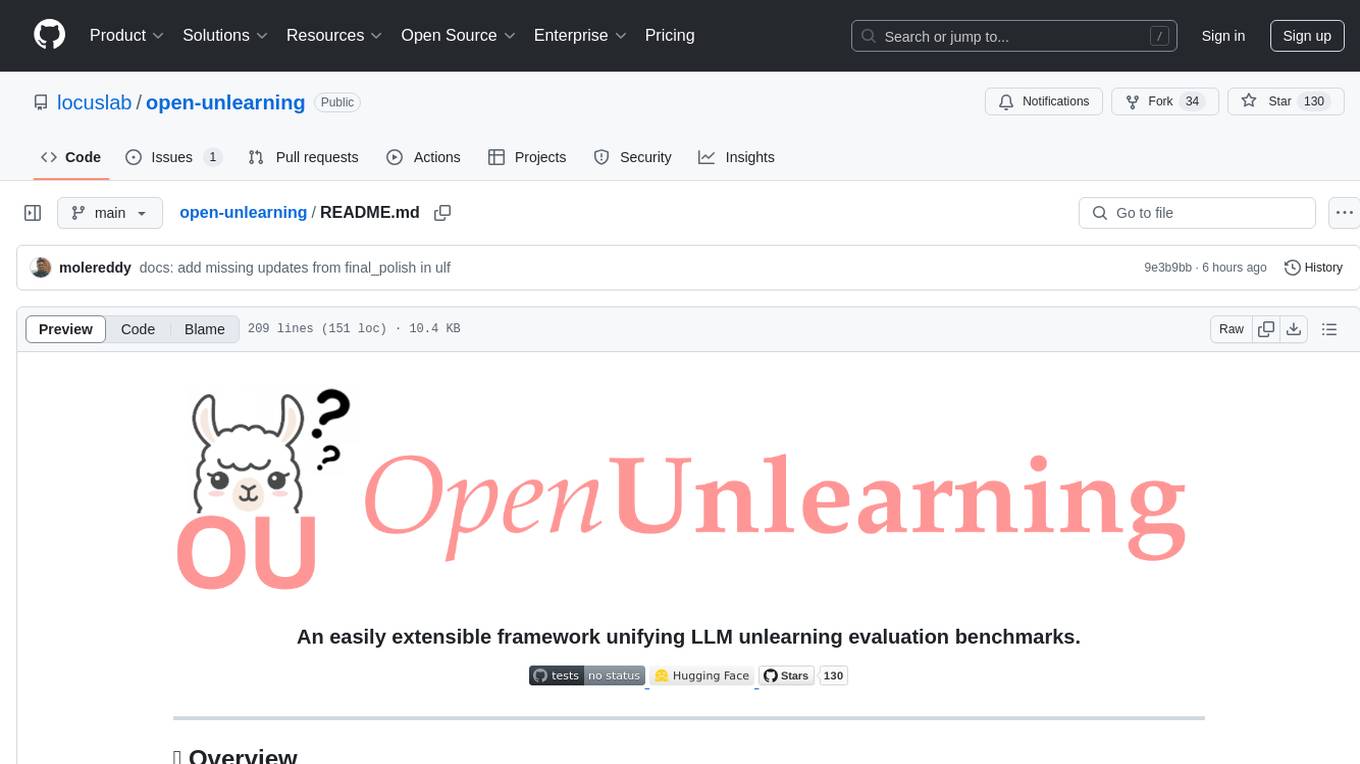
open-unlearning
OpenUnlearning is an easily extensible framework that unifies LLM unlearning evaluation benchmarks. It provides efficient implementations of TOFU and MUSE unlearning benchmarks, supporting 5 unlearning methods, 3+ datasets, 6+ evaluation metrics, and 7+ LLMs. Users can easily extend the framework to incorporate more variants, collaborate by adding new benchmarks, unlearning methods, datasets, and evaluation metrics, and drive progress in the field.
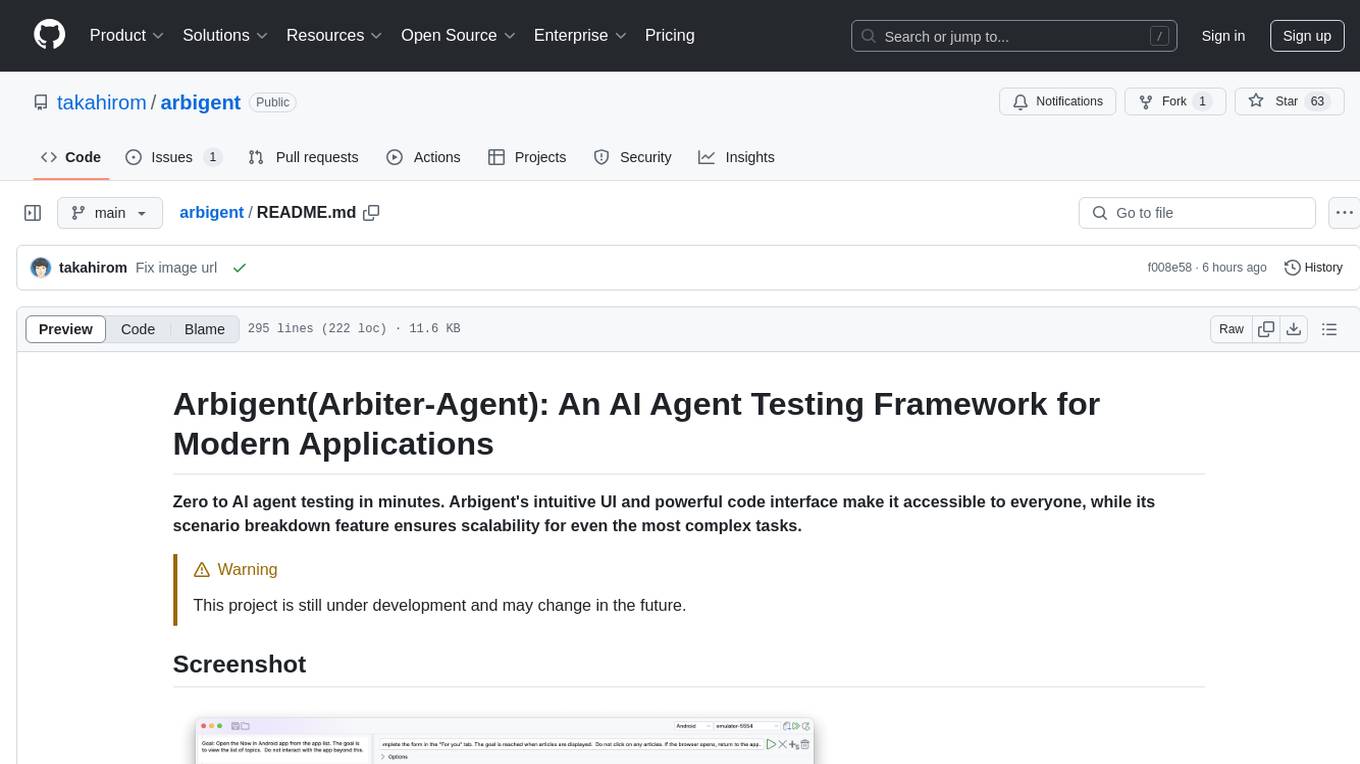
arbigent
Arbigent (Arbiter-Agent) is an AI agent testing framework designed to make AI agent testing practical for modern applications. It addresses challenges faced by traditional UI testing frameworks and AI agents by breaking down complex tasks into smaller, dependent scenarios. The framework is customizable for various AI providers, operating systems, and form factors, empowering users with extensive customization capabilities. Arbigent offers an intuitive UI for scenario creation and a powerful code interface for seamless test execution. It supports multiple form factors, optimizes UI for AI interaction, and is cost-effective by utilizing models like GPT-4o mini. With a flexible code interface and open-source nature, Arbigent aims to revolutionize AI agent testing in modern applications.
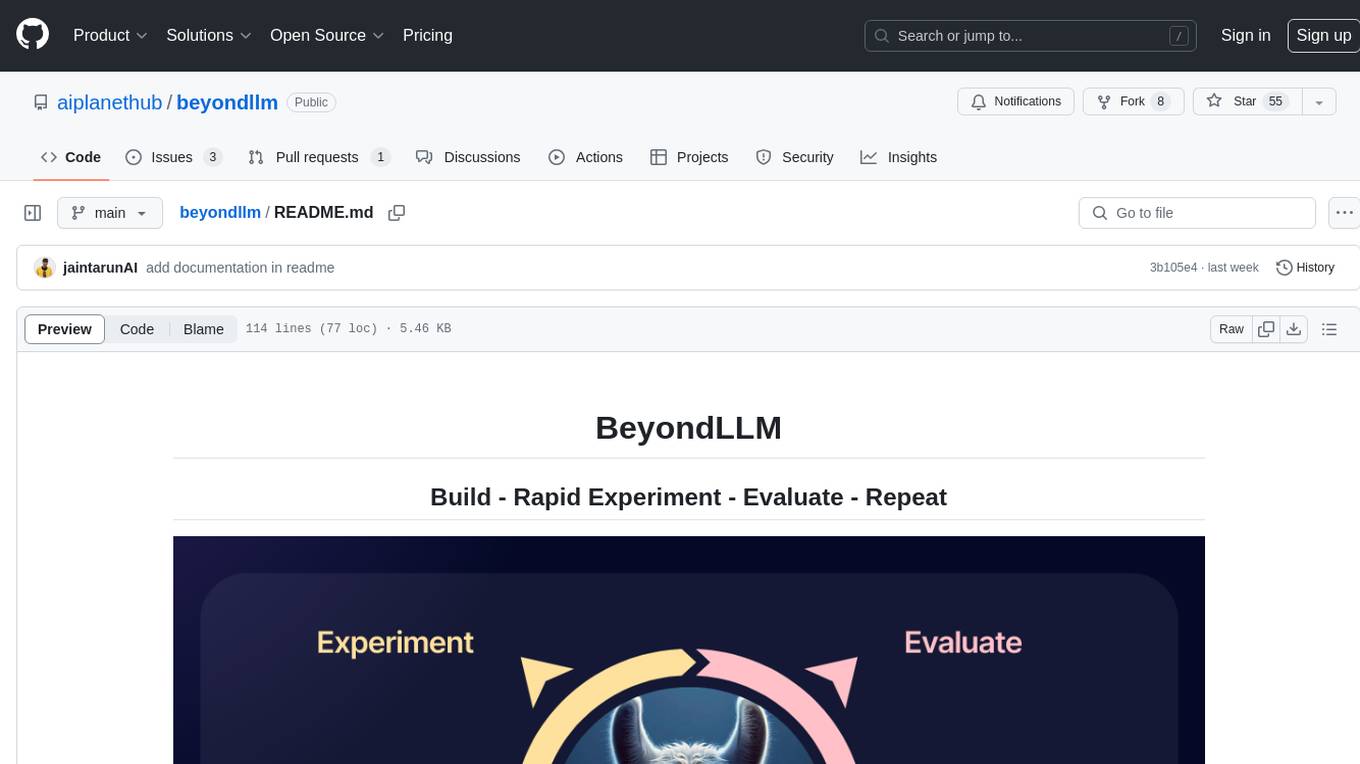
beyondllm
Beyond LLM offers an all-in-one toolkit for experimentation, evaluation, and deployment of Retrieval-Augmented Generation (RAG) systems. It simplifies the process with automated integration, customizable evaluation metrics, and support for various Large Language Models (LLMs) tailored to specific needs. The aim is to reduce LLM hallucination risks and enhance reliability.
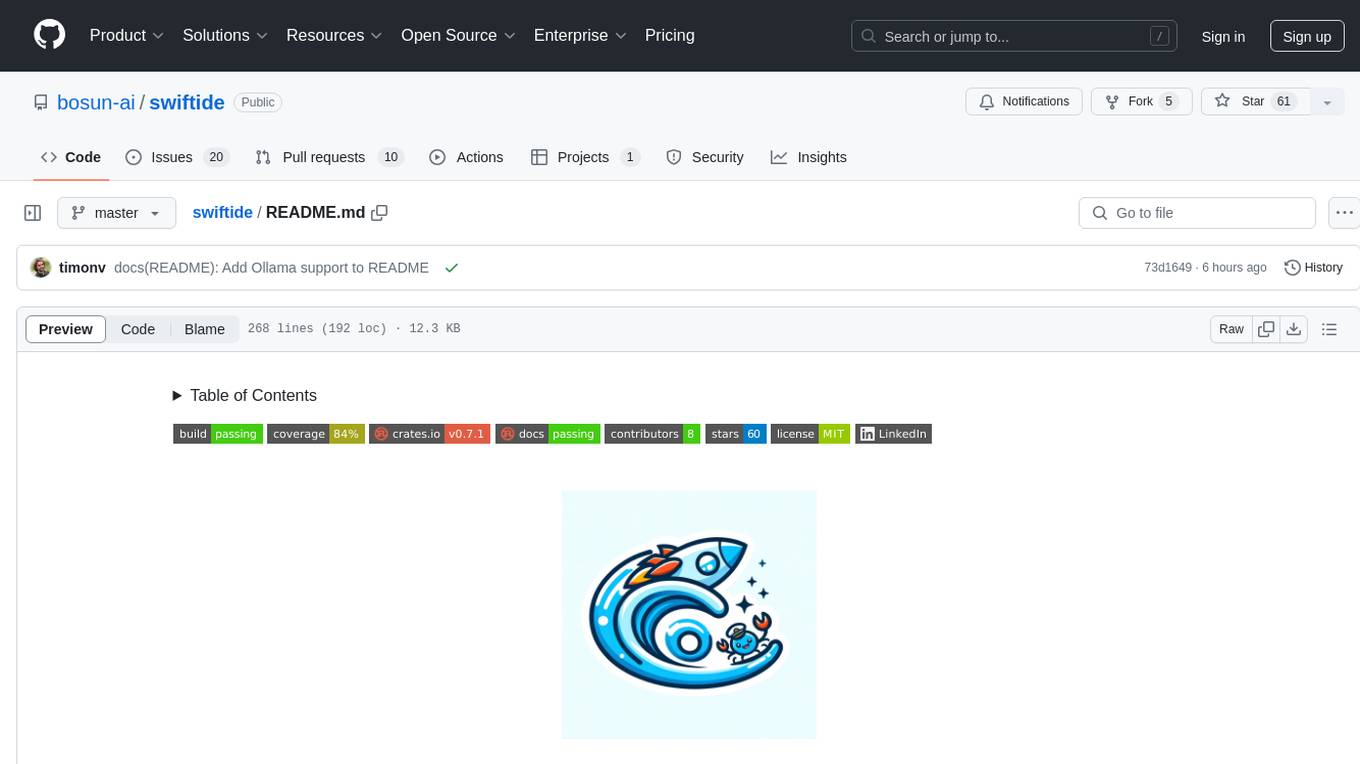
swiftide
Swiftide is a fast, streaming indexing and query library tailored for Retrieval Augmented Generation (RAG) in AI applications. It is built in Rust, utilizing parallel, asynchronous streams for blazingly fast performance. With Swiftide, users can easily build AI applications from idea to production in just a few lines of code. The tool addresses frustrations around performance, stability, and ease of use encountered while working with Python-based tooling. It offers features like fast streaming indexing pipeline, experimental query pipeline, integrations with various platforms, loaders, transformers, chunkers, embedders, and more. Swiftide aims to provide a platform for data indexing and querying to advance the development of automated Large Language Model (LLM) applications.
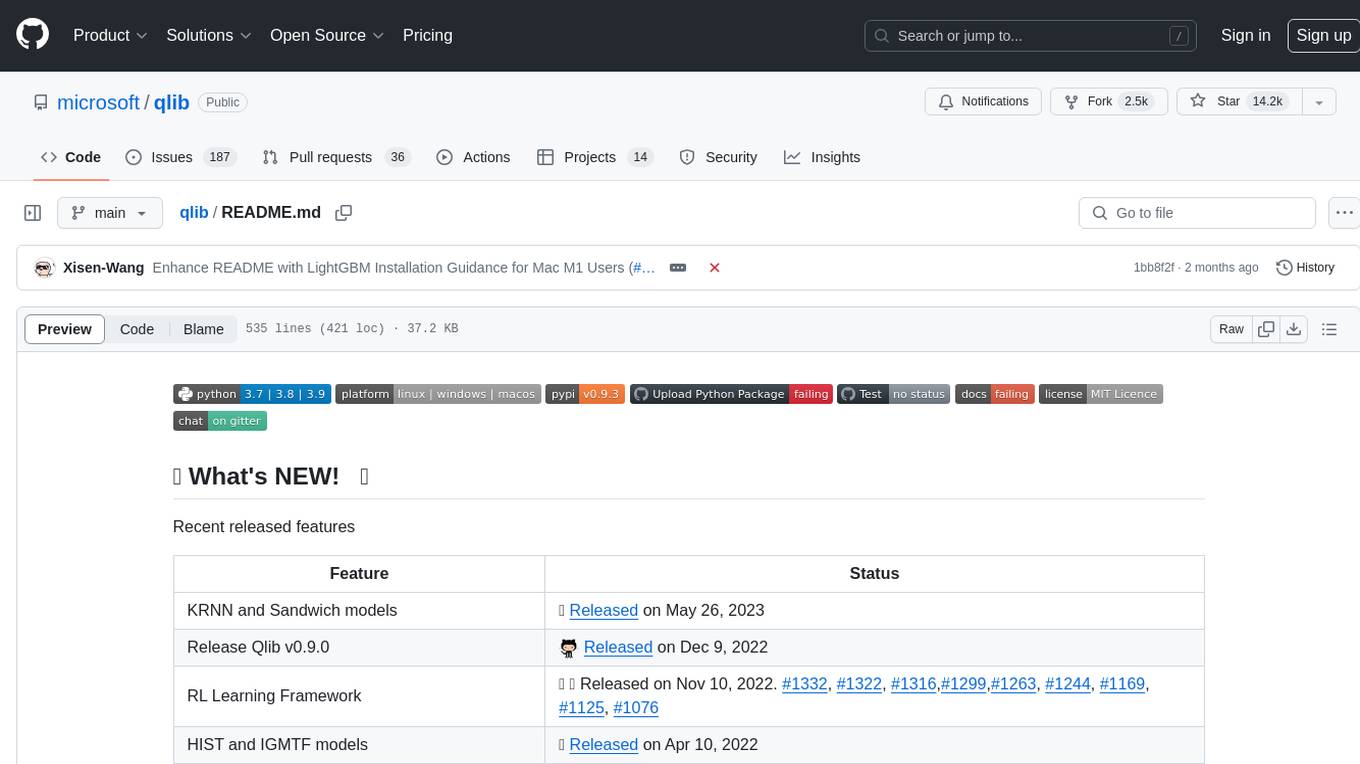
qlib
Qlib is an open-source, AI-oriented quantitative investment platform that supports diverse machine learning modeling paradigms, including supervised learning, market dynamics modeling, and reinforcement learning. It covers the entire chain of quantitative investment, from alpha seeking to order execution. The platform empowers researchers to explore ideas and implement productions using AI technologies in quantitative investment. Qlib collaboratively solves key challenges in quantitative investment by releasing state-of-the-art research works in various paradigms. It provides a full ML pipeline for data processing, model training, and back-testing, enabling users to perform tasks such as forecasting market patterns, adapting to market dynamics, and modeling continuous investment decisions.
For similar tasks

evidently
Evidently is an open-source Python library designed for evaluating, testing, and monitoring machine learning (ML) and large language model (LLM) powered systems. It offers a wide range of functionalities, including working with tabular, text data, and embeddings, supporting predictive and generative systems, providing over 100 built-in metrics for data drift detection and LLM evaluation, allowing for custom metrics and tests, enabling both offline evaluations and live monitoring, and offering an open architecture for easy data export and integration with existing tools. Users can utilize Evidently for one-off evaluations using Reports or Test Suites in Python, or opt for real-time monitoring through the Dashboard service.
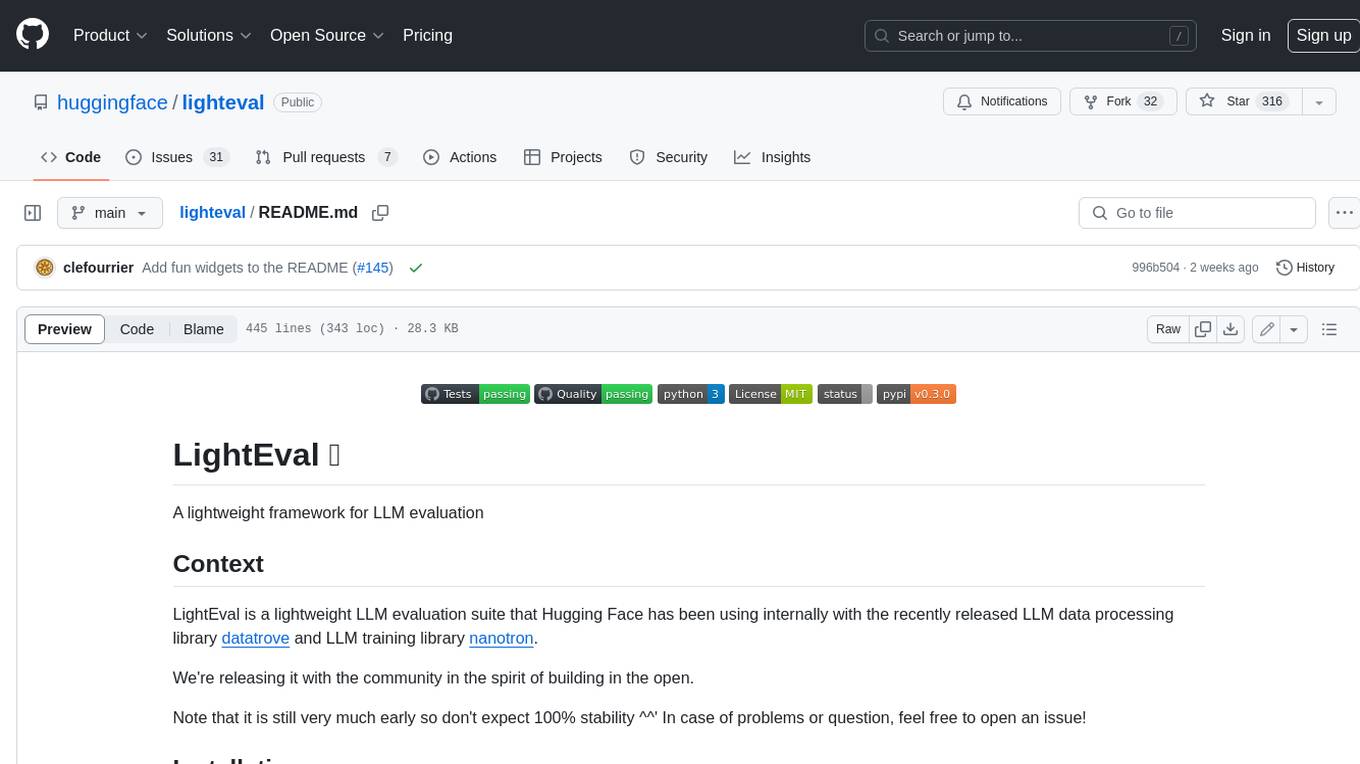
lighteval
LightEval is a lightweight LLM evaluation suite that Hugging Face has been using internally with the recently released LLM data processing library datatrove and LLM training library nanotron. We're releasing it with the community in the spirit of building in the open. Note that it is still very much early so don't expect 100% stability ^^' In case of problems or question, feel free to open an issue!
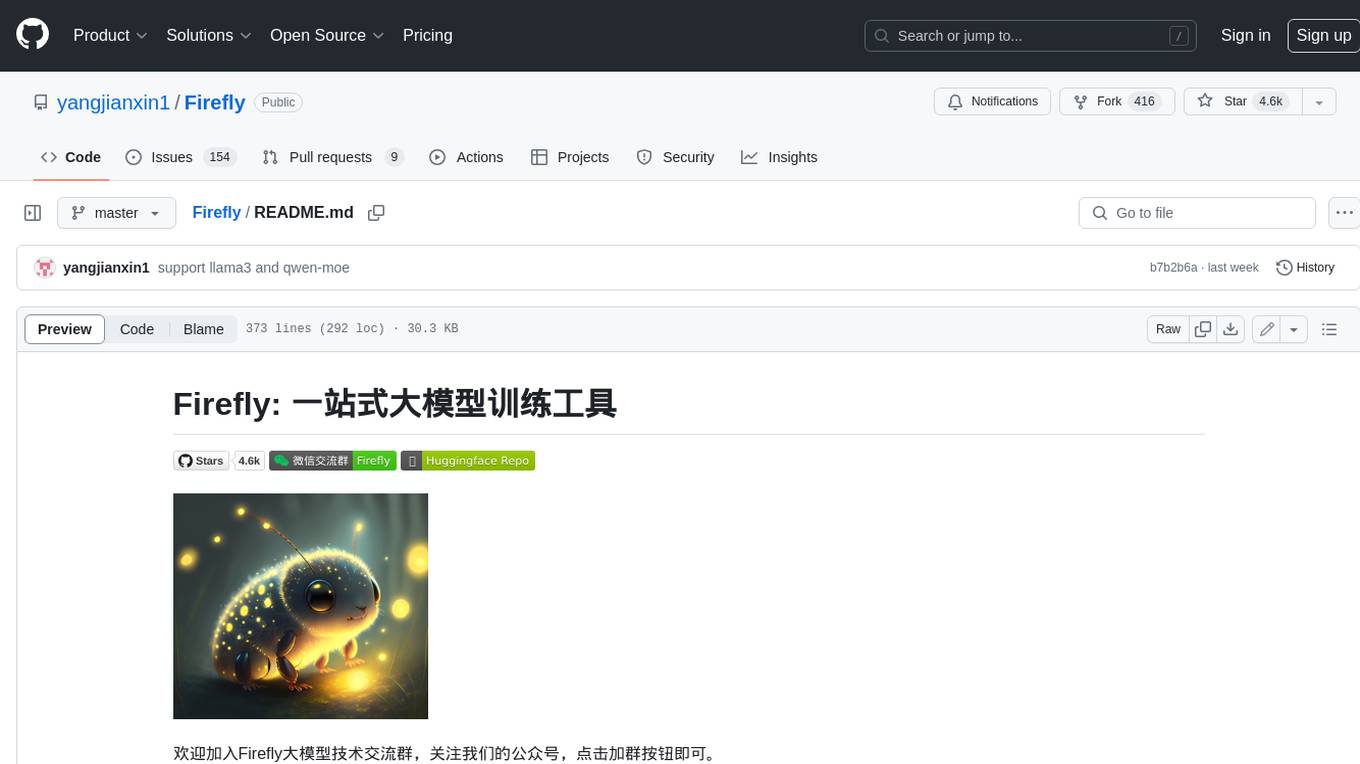
Firefly
Firefly is an open-source large model training project that supports pre-training, fine-tuning, and DPO of mainstream large models. It includes models like Llama3, Gemma, Qwen1.5, MiniCPM, Llama, InternLM, Baichuan, ChatGLM, Yi, Deepseek, Qwen, Orion, Ziya, Xverse, Mistral, Mixtral-8x7B, Zephyr, Vicuna, Bloom, etc. The project supports full-parameter training, LoRA, QLoRA efficient training, and various tasks such as pre-training, SFT, and DPO. Suitable for users with limited training resources, QLoRA is recommended for fine-tuning instructions. The project has achieved good results on the Open LLM Leaderboard with QLoRA training process validation. The latest version has significant updates and adaptations for different chat model templates.
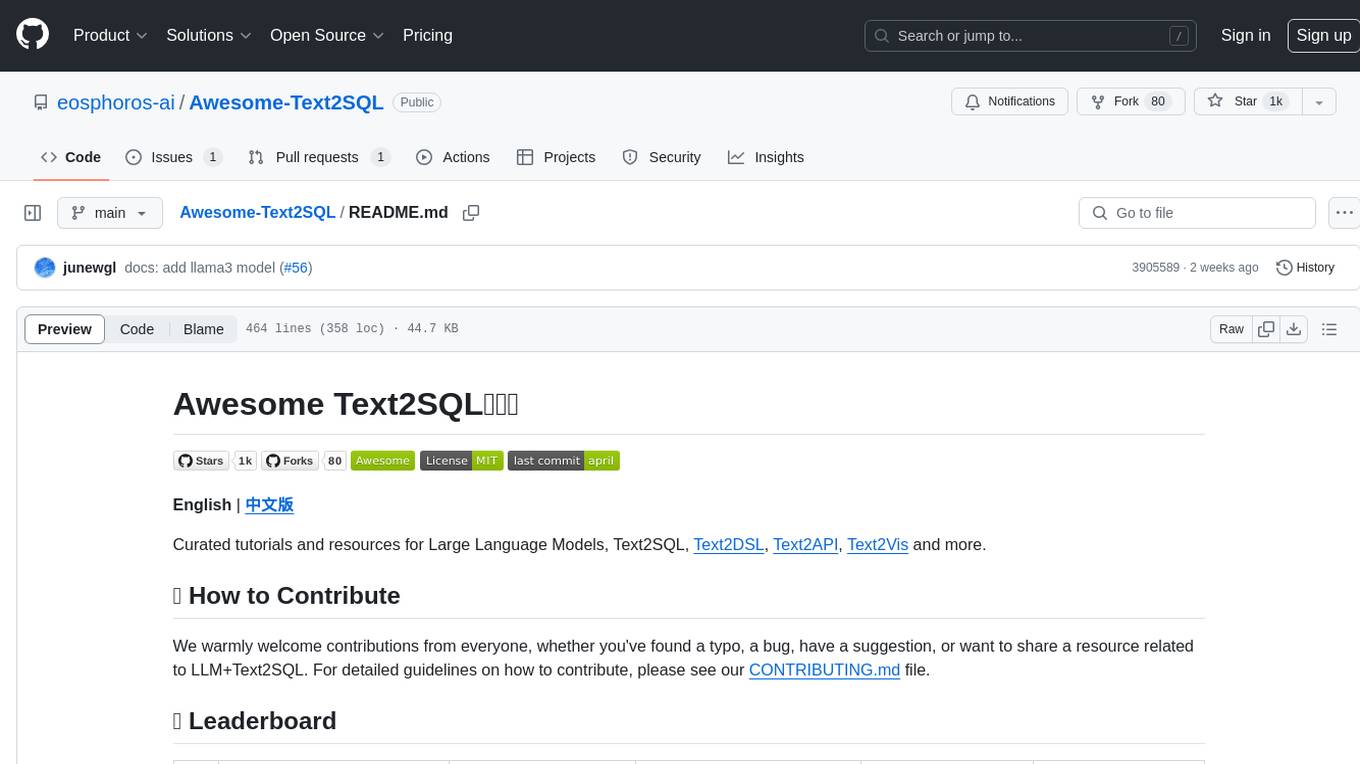
Awesome-Text2SQL
Awesome Text2SQL is a curated repository containing tutorials and resources for Large Language Models, Text2SQL, Text2DSL, Text2API, Text2Vis, and more. It provides guidelines on converting natural language questions into structured SQL queries, with a focus on NL2SQL. The repository includes information on various models, datasets, evaluation metrics, fine-tuning methods, libraries, and practice projects related to Text2SQL. It serves as a comprehensive resource for individuals interested in working with Text2SQL and related technologies.
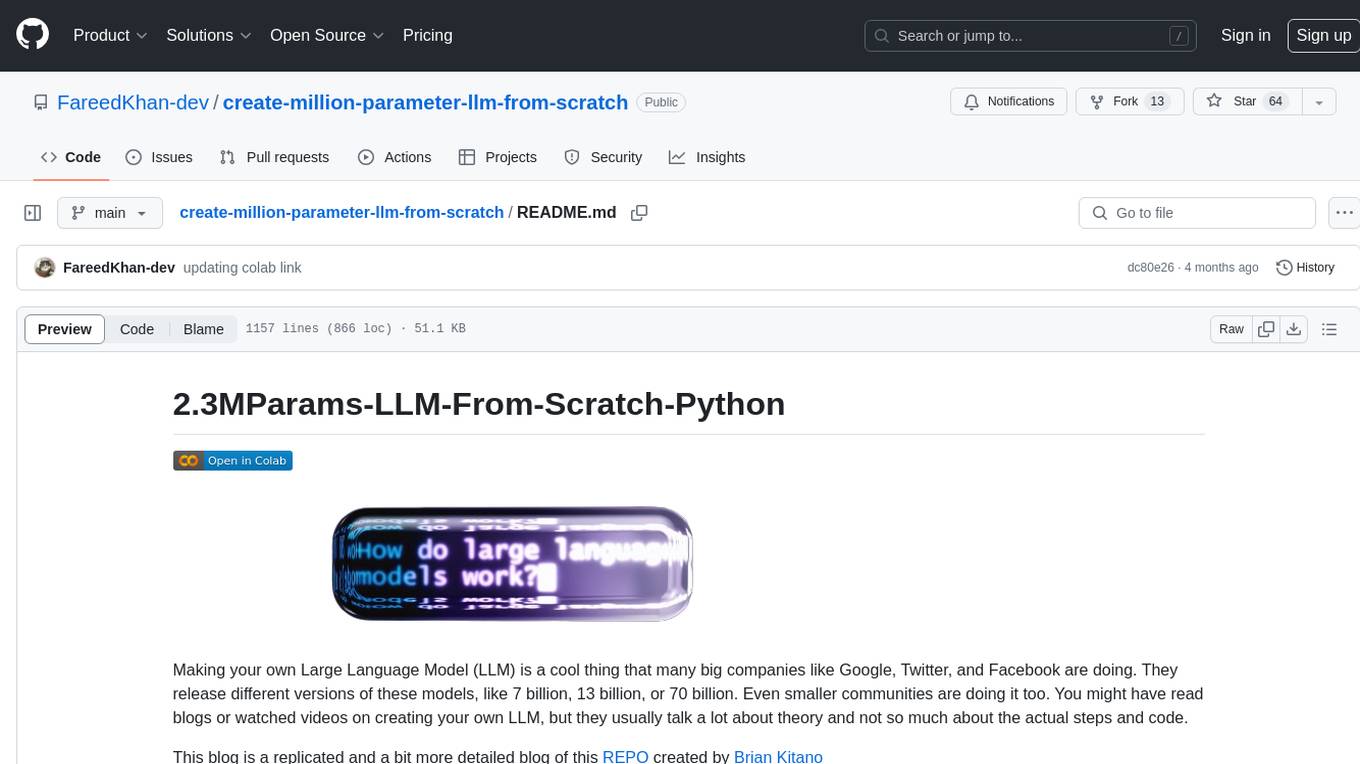
create-million-parameter-llm-from-scratch
The 'create-million-parameter-llm-from-scratch' repository provides a detailed guide on creating a Large Language Model (LLM) with 2.3 million parameters from scratch. The blog replicates the LLaMA approach, incorporating concepts like RMSNorm for pre-normalization, SwiGLU activation function, and Rotary Embeddings. The model is trained on a basic dataset to demonstrate the ease of creating a million-parameter LLM without the need for a high-end GPU.
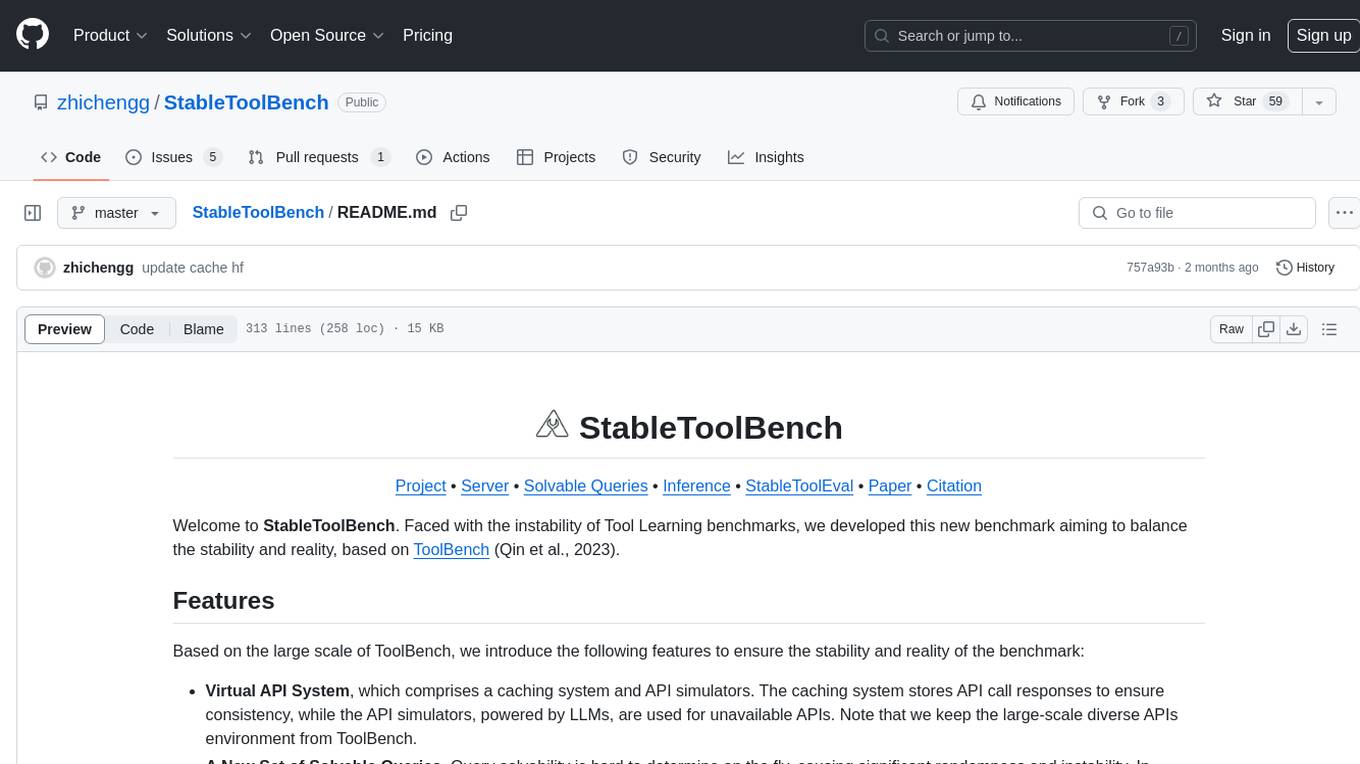
StableToolBench
StableToolBench is a new benchmark developed to address the instability of Tool Learning benchmarks. It aims to balance stability and reality by introducing features such as a Virtual API System with caching and API simulators, a new set of solvable queries determined by LLMs, and a Stable Evaluation System using GPT-4. The Virtual API Server can be set up either by building from source or using a prebuilt Docker image. Users can test the server using provided scripts and evaluate models with Solvable Pass Rate and Solvable Win Rate metrics. The tool also includes model experiments results comparing different models' performance.
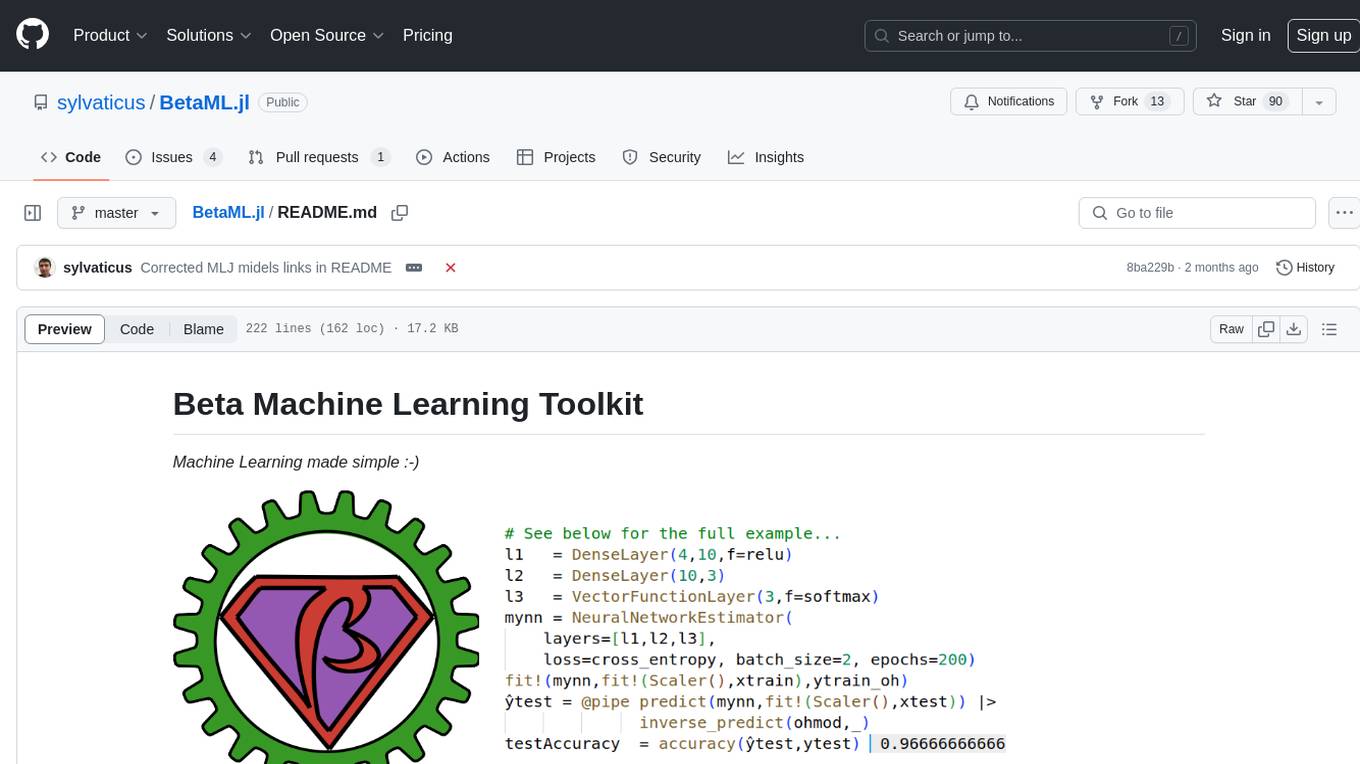
BetaML.jl
The Beta Machine Learning Toolkit is a package containing various algorithms and utilities for implementing machine learning workflows in multiple languages, including Julia, Python, and R. It offers a range of supervised and unsupervised models, data transformers, and assessment tools. The models are implemented entirely in Julia and are not wrappers for third-party models. Users can easily contribute new models or request implementations. The focus is on user-friendliness rather than computational efficiency, making it suitable for educational and research purposes.
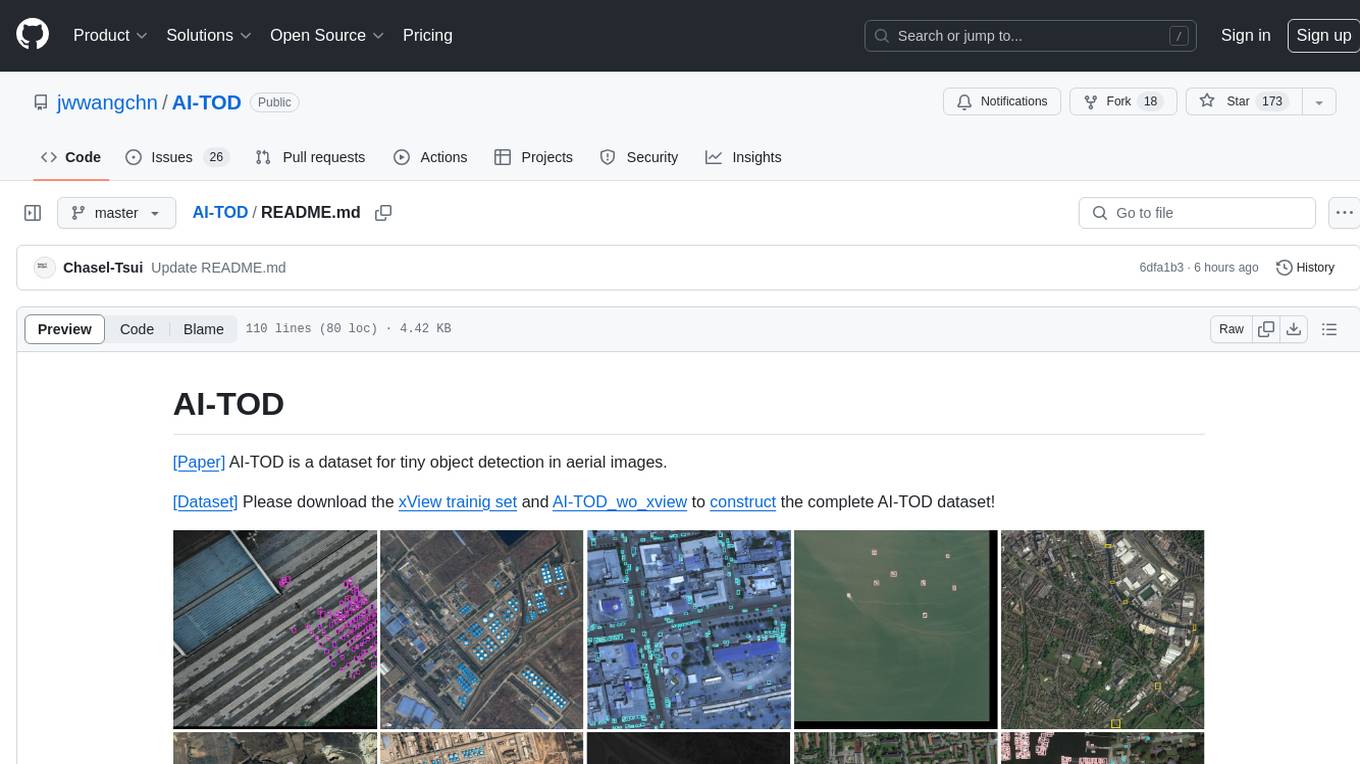
AI-TOD
AI-TOD is a dataset for tiny object detection in aerial images, containing 700,621 object instances across 28,036 images. Objects in AI-TOD are smaller with a mean size of 12.8 pixels compared to other aerial image datasets. To use AI-TOD, download xView training set and AI-TOD_wo_xview, then generate the complete dataset using the provided synthesis tool. The dataset is publicly available for academic and research purposes under CC BY-NC-SA 4.0 license.
For similar jobs

weave
Weave is a toolkit for developing Generative AI applications, built by Weights & Biases. With Weave, you can log and debug language model inputs, outputs, and traces; build rigorous, apples-to-apples evaluations for language model use cases; and organize all the information generated across the LLM workflow, from experimentation to evaluations to production. Weave aims to bring rigor, best-practices, and composability to the inherently experimental process of developing Generative AI software, without introducing cognitive overhead.

LLMStack
LLMStack is a no-code platform for building generative AI agents, workflows, and chatbots. It allows users to connect their own data, internal tools, and GPT-powered models without any coding experience. LLMStack can be deployed to the cloud or on-premise and can be accessed via HTTP API or triggered from Slack or Discord.

VisionCraft
The VisionCraft API is a free API for using over 100 different AI models. From images to sound.

kaito
Kaito is an operator that automates the AI/ML inference model deployment in a Kubernetes cluster. It manages large model files using container images, avoids tuning deployment parameters to fit GPU hardware by providing preset configurations, auto-provisions GPU nodes based on model requirements, and hosts large model images in the public Microsoft Container Registry (MCR) if the license allows. Using Kaito, the workflow of onboarding large AI inference models in Kubernetes is largely simplified.

PyRIT
PyRIT is an open access automation framework designed to empower security professionals and ML engineers to red team foundation models and their applications. It automates AI Red Teaming tasks to allow operators to focus on more complicated and time-consuming tasks and can also identify security harms such as misuse (e.g., malware generation, jailbreaking), and privacy harms (e.g., identity theft). The goal is to allow researchers to have a baseline of how well their model and entire inference pipeline is doing against different harm categories and to be able to compare that baseline to future iterations of their model. This allows them to have empirical data on how well their model is doing today, and detect any degradation of performance based on future improvements.

tabby
Tabby is a self-hosted AI coding assistant, offering an open-source and on-premises alternative to GitHub Copilot. It boasts several key features: * Self-contained, with no need for a DBMS or cloud service. * OpenAPI interface, easy to integrate with existing infrastructure (e.g Cloud IDE). * Supports consumer-grade GPUs.

spear
SPEAR (Simulator for Photorealistic Embodied AI Research) is a powerful tool for training embodied agents. It features 300 unique virtual indoor environments with 2,566 unique rooms and 17,234 unique objects that can be manipulated individually. Each environment is designed by a professional artist and features detailed geometry, photorealistic materials, and a unique floor plan and object layout. SPEAR is implemented as Unreal Engine assets and provides an OpenAI Gym interface for interacting with the environments via Python.

Magick
Magick is a groundbreaking visual AIDE (Artificial Intelligence Development Environment) for no-code data pipelines and multimodal agents. Magick can connect to other services and comes with nodes and templates well-suited for intelligent agents, chatbots, complex reasoning systems and realistic characters.


